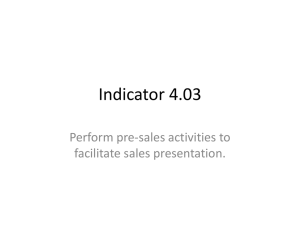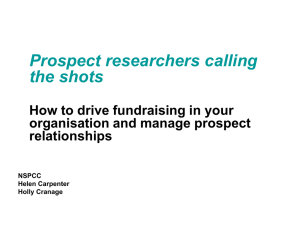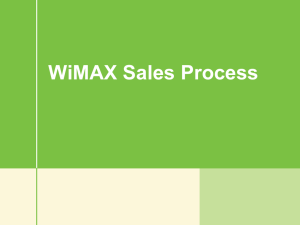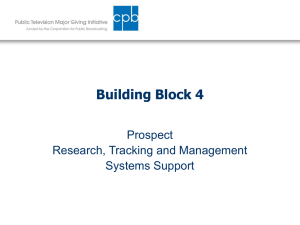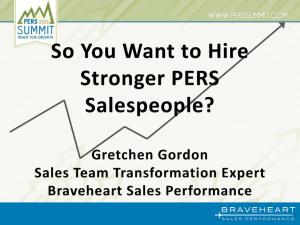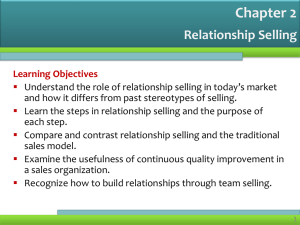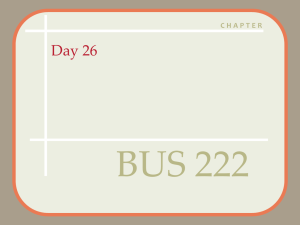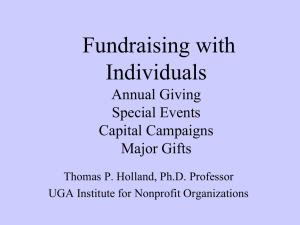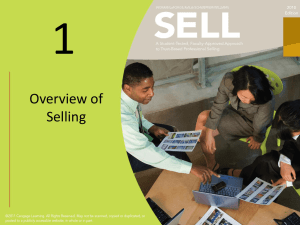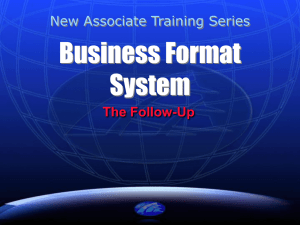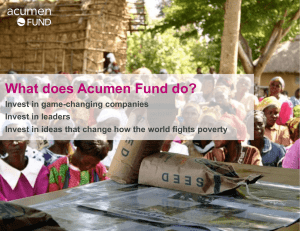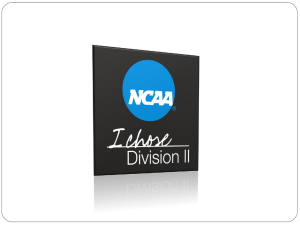Sales Acumen Survey
advertisement
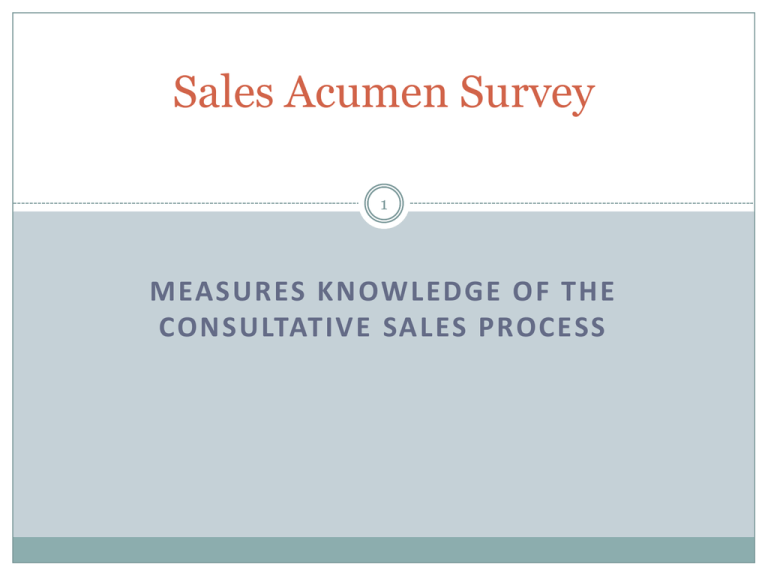
Sales Acumen Survey 1 MEASURES KNOWLEDGE OF THE CONSULTATIVE SALES PROCESS Sales Acumen Survey 2 Measures understanding and application of the consultative sales process Provides insight into 7 key consultative sales areas, plus general sales knowledge 80 questions – 10 in each sales area 45-60 minutes to complete Generates developmental recommendations (books, video training, etc.) Will compare to a national norm 7 Consultative Sales Areas 3 Prospecting First Meeting/Opening the Call Probing/investigating Presentation Influencing/Convincing Working with Objections Making the Sale/Closing General Sales Knowledge 7 Consultative Sales Areas 4 Prospecting: How do you determine whether a prospect is a high probability to buy prospect? a) b) c) d) The prospect has set an appointment time to meet with you. Everyone is a prospect for something. By helping the prospect qualify himself as a prospect. They will ask you to call them back. 7 Consultative Sales Areas 5 Prospecting: Social events can be a good opportunity to meet new prospects. How would you use a social event to prospect? a) Talk with potential prospects, find out what they do, share what you do and then thank them for talking with you. When you get back in your office email or send them information or call to set an appointment. Everyone is a prospect for something. b) Work the crowd at the social event, meeting as many people as possible; handing out your business card to everyone you meet. c) While you are visiting with people at the social event make an effort to set an appointment to meet with them. d) Meet as many people as you can, be a good listener, attempt to find out what they do, but limit the information your share about yourself and what you do. 7 Consultative Sales Areas 6 First Meeting: You have told your prospect who you are and why you are there. What is your next step with your prospect? a) Introduce your products and services. b) Share how pleased other clients are because they are using your products and services. c) Get the prospect to agree to let you ask questions. d) Provide your prospect with additional information about your company. 7 Consultative Sales Areas 7 First Meeting: You are planning to call on a specific prospect, what is the most important thing you can do to ensure the meeting is a success? a) b) c) d) Research your prospect to understand what his potential needs could be. Put together testimonial letters from pleased clients. Research his present vendor to understand what his needs may be. Talk with others in your industry to gain insight about the company and the individual you will be meeting. 7 Consultative Sales Areas 8 Working with Objections: Your prospect says she presently has a short term money problem, so she will have to delay buying from you. What is the best solution to this situation? a) Suggest you will put together a financing arrangement that would be suitable for her company, for you and your company. b) Probe to determine whether cash flow is a real problem or just an excuse not to buy from you. c) Recognize she is giving you an opening to talk about the terms that will allow her to buy your product or service. d) Take time to review the features, advantages and benefits with her and try to close the sale again. 7 Consultative Sales Areas 9 Closing: Near the end of the meeting with your prospect you determine there is no real chance of closing the sale. What is the next step with this prospect? a) Thank her for her time and ask her if it would be okay if you called her for her decision. b) Suggest you set another appointment to cover items that were a result of this meeting. c) Share with your prospect that you felt your meeting was constructive and ask to set another appointment. d) Express to her that you felt the meeting was productive and ask what she thinks the next step should be. Survey Login 10 Survey Agreement Page 11 Sample Question/Personal Informantion 12 13 Sales Acumen Survey Report Prepared for Susan Roberts ABC Inc. Introduction The Sales Acumen Survey is designed to discover an individual’s awareness and knowledge of the successful strategies encompassed in the consultative and relationship oriented sales model at key stages of the sales process. It’s often said the best salespeople are “born – not made.” This may seem true for traits such as persistence, empathy and high aspirations. However, it’s not true for the essential processes and skills associated with effective selling. They must be learned. So what are the elusive knowledge and skill sets that separate successful sellers from the others? Sales knowledge is not a predictor of sales success; it is simply a measure of an individual’s knowledge of the consultative and relationship oriented sales process at this point in time. There are other desirable, innate, natural characteristics that contribute to sales success. These behaviors are measured through the use of competencies. Knowing how to approach a sales situation comes naturally for some salespeople. Other salespeople may need to improve their understanding and application of the consultative sales role to increase their sales effectiveness. You will see how you scored in each stage of the consultative sales process and general sales knowledge. Your report will highlight your strengths and areas in need of development. You and your sales manager can use this information to target your training activities and efforts. Gavin Ingham reminds us that “knowing what to do is not the same as doing what you know.” Sales is about applying skills, not just knowing them. 14 Sales Acumen Survey Graphic Profile This graphic profile is a snapshot of your Sales Acumen Survey results. The results have been placed on a scale of 0 to 100. The higher an individual’s score in each stage of the consultative sales process measured by the survey, the greater the individual’s knowledge is in this particular selling stage. The need for development generally occurs when an individual’s score in a consultative selling stage th drops below the 70 percentile. However, the need for training and development will be determined by the individual completing the survey and the individual’s sales manager. Survey Report Sample 15 Getting the Business/Closing Traditionally, strategies for closing the sale has involved pressuring prospects and clients, neutralizing their stalling tactics, and overcoming their objections -- behaviors that are in direct opposition to the philosophy of the consultative process. On the other hand, salespeople afraid of harming the relationship they’ve nurtured by appearing too aggressive, hope the deal will close itself -- something which rarely happens. Consultative closing provides the solution, breaking up the closing process into small, actionable steps that help the salesperson gain gradual buy-in and establish a long-term working relationship with the prospect or client. If you have successfully performed the earlier steps in the selling process, the close follows naturally. Closing is simply asking your prospect or client for a decision. It has been said that salespeople must “close early and close often.” This is not recommended when you are working to build trust relationships with prospects and clients. By following this philosophy you are building an adversarial relationship. A prospect or client is likely to regard asking for the order before he or she is ready to buy as pushy. You don’t want to seem pushy, or overly aggressive. If you do, the client is likely to start pushing back. Research supports the idea of not being too pushy when attempting to close a sale. Successful salespeople tend to let the prospect or client make the decision. This doesn’t mean that successful salespeople expect to close only once. Often, undetermined needs still must be addressed. This is one reason that salespeople must be prepared to use various closes with their prospect or client throughout the consultative sales process. th 50 to 69 th percentile Susan, it would be helpful if you developed a stronger understanding of the getting the business phase of the sales process. Improving your knowledge of this vital phase of the sales process will help you improve your ability to close more sales. This process is typically divided into steps that help the salesperson gain gradual buy-in from the prospect or client. This closing process helps establish a long-term working relationship with the prospect or client. If you would like to increase your knowledge and skill in this area: Books Closing Techniques (That Really Work!) by Stephan Schiffman (Mar 18, 2009) Consultative Closing: Simple Steps That Build Relationships and Win Even the Toughest Sale by Greg Bennett (Nov 14, 2006) The Sales Closing Book: Tested Closes for Every Selling Situation! by Gerhard Gschwandtner (Sep 1, 2008) Online Courses Distributor Pricing 16 3 Units per report 20-199 $5.50 per unit 200-499 $5.05 per unit 500-999 $4.65 per unit 1000+ $4.25 per unit Initial starter kit $327.
